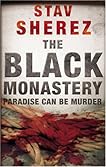A list of mysteries set in the Greek islands has been compiled by book blogger
Euro Crime.
Also included are
The Doctor of Thessaly by Anne Zouroudi and
Basic Shareholder by Petros Makaris. The above are to be printed/reprinted this year.
See also my reviews of other Greek mystery novels at
More Greek Island Mystery Novels, including The Black Monastery >>
Let me know if anyone has suggestions for other books not included here!
The Tomb of Zeus by Barbara Cleverly is an archaeology mystery published in 2007.
Those who love Greece, the Greek Isles, and Greek mythology will have little problem with the archaeological setting - the island of Crete in the late 1920s.
Laetitia Talbot, a student from Cambridge, is sent by her professor to work on the island with British archaeologist Theodore Russell. Russell has invited her to stay with him and his wife and two other students at his Villa Europa.
When she arrives, Laetitia is disturbed by an air of menace at the villa. When one of the occupants dies, Laetitia's discomfort definitely increases. Was the death a murder or a suicide? She is determined to find out, even if she has to unearth all the secrets surrounding the villa.
Interestingly, the characters in the story parallel the characters in Greek mythology. Theseus of Greek myth arrives in Crete to find and slay the half-man, half-bull Minotaur hidden in a labyrinth underground. Theodore Russell is in Crete at a much later date to unearth ancient Greek statues and temples in archaeological digs. Theodore's complicated family and love life also parallels that of Theseus.
Laetitia is aware of this as she searches for clues to solve the murder. She is helped by a former lover, William Gunning, who is working with her in Crete. Together they uncover an ancient tomb at their work site that only creates a second mystery. Have they found the long-sought tomb of the Greek god, Zeus?
A very enjoyable book that deals with a murder mystery and an archaeological mystery. The plot revolves around Cretan culture, history, mythology, and religion, and also around Laetita's attempts to solve a present day murder in a very exotic locale.
More on
antiquities on Crete.
Judith Gould's 2008 novel,
Greek Winds of Fury, described as romantic suspense, is a mystery novel without thriller elements of extreme violence, or graphic descriptions of blood and guts, etc. Armchair travelers as well as cozy readers will enjoy this trip into Greece and the island of Samos.
The protagonist Miranda, part Greek and an employee of a well known antiquities establishment in New York City, is delighted to be invited by a former professor to an archaeological dig on Samos during the summer. The crew is trying to find a lost statue of the goddess Hera, created in the th century B.C.
Miranda takes a cruise ship to the island and arrives in Samos to discover dangerous mysteries and a new love interest. She discovers that the ship has been using the identities of real passengers to create false passports and boarding passes for illegal immigrants, who are hustled from a port in Turkey to European ports.
Not only that, but there seems to be smuggling of antiquities from the Samos site to art stores and dealers around the world. Some of the missing pieces Miranda recognizes as part of the shipments to her own place of work in NYC. Crew members of the site on Samos have been disappearing, moreover, and one body is washed ashore after Miranda arrives there. "Big Mike" from the U.S. helps Miranda discover the truth, even at the cost of much danger to themselves.
Gould's detailed and colorful descriptions of place, setting, and people make this book a nice armchair travel piece. The plot will also appeal to mystery lovers and aficionados of Greek culture and antiquity. I confess though that parts of the novel dragged, especially toward the end. Some of the extended dialogue and a gratuitous sex scene that does not clarify or advance the plot could have been cut. I got impatient at the end for the denouement, so to speak, but overall the novel was enjoyable, with a good plot, deft prose, and a good substitute for the real thing - a mystery cruise on the
Aegean









